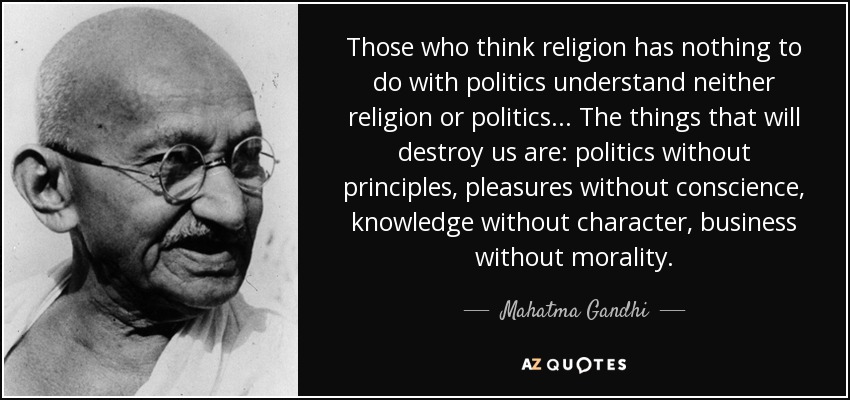A new battle of faith is being driven by some pastors and politicians in the United States. Their central message is that the country's conservative Christian way of life is under threat, and American society is moving in the wrong direction.
Off Topix: Embrace the Unexpected in Every Discussion
Off Topix is a well established general discussion forum that originally opened to the public way back in 2009! We provide a laid back atmosphere and our members are down to earth. We have a ton of content and fresh stuff is constantly being added. We cover all sorts of topics, so there's bound to be something inside to pique your interest. We welcome anyone and everyone to register & become a member of our awesome community.
You are using an out of date browser. It may not display this or other websites correctly.
You should upgrade or use an alternative browser.
You should upgrade or use an alternative browser.
The Christian Right's Effort To Take Over America
- Thread starter Rustin Cohle
- Start date
...the country's conservative christian way of life? In a country founded on freedom of religion and separation of church and state? Okies...
We were founded by puritans.
YikesPuritanism may be defined primarily by the intensity of the religious experience that it fostered. Puritans believed that it was necessary to be in a covenant relationship with God in order to be redeemed from one’s sinful condition, that God had chosen to reveal salvation through preaching, and that the Holy Spirit was the energizing instrument of salvation. Calvinist theology and polity proved to be major influences in the formation of Puritan teachings. This naturally led to the rejection of much that was characteristic of Anglican ritual at the time, these being viewed as “popish idolatry.” In its place the Puritans emphasized preaching that drew on images from scripture and from everyday experience. Still, because of the importance of preaching, the Puritans placed a premium on a learned ministry. The moral and religious earnestness that was characteristic of Puritans was combined with the doctrine of predestination inherited from Calvinism to produce a “covenant theology,” a sense of themselves as the elect chosen by God to live godly lives both as individuals and as a community.

That's true, but the founding the doctrine of the United States is based on freedom of religion and separation of church and state. I remember reading Sinners in the Hands of an Angry God, the things those Puritans were into...eek.We were founded by puritans.
Yikes
We were founded by puritans.
Yikes
As bad as the Puritans were back in the day, remember that they were dissenting from the established state church in England (which later on explains the references to religion in the Constitution).That's true, but the founding the doctrine of the United States is based on freedom of religion and separation of church and state. I remember reading Sinners in the Hands of an Angry God, the things those Puritans were into...eek.
Also, as bad as Puritans were, they'd be treated as heretics (if not worse) by evangelical Christians today.
...the country's conservative christian way of life? In a country founded on freedom of religion and separation of church and state? Okies...
The more educated people become, the less they want anything to do with a religion.

Decline of Christianity in the Western world - Wikipedia

Christianity in the U.S. is quickly shrinking and may no longer be the majority religion within just a few decades, research finds
A new report finds that the number of people choosing to disaffiliate from Christianity is increasing – and could overtake the nation's Christian majority.
People said that back following the fall of Rome and the arrival of the "Dark Ages" yet guess which places survived as centers of learning in a dark world?The more educated people become, the less they want anything to do with a religion.
Churches, monasteries, abbeys...for instance, some of the first universities in Western Europe were created not by secular authorities but by religious authorities (specifically, the Catholic Church).. Did they have ulterior reasons for starting them? Most likely yes; after all, their corrupt practices helped fuel the Protestant Reformation in the 1500's.
Is the world overall a better place because religious authorities worked to preserve the past & its' storehouses of knowledge? Yes we are.
Sure. I can agree that if some people didn't have their religion, they'd throw away what little morality they already have.Is the world overall a better place because religious authorities worked to preserve the past & its' storehouses of knowledge?
Gandhi of all people said it best....Sure. I can agree that if some people didn't have their religion, they'd throw away what little morality they already have.

Is the world overall a better place because religious authorities
Every religion reflects the society which invents it and the people who practice it. Unsurprisingly, religions tend to evolve and even fade away as societies evolve. It is also directly responsible for many atrocities and horrors people have inflicted on each other. Admittedly, at least in my own opinion, people do some fairly evil shit, whether or not they belong to a religion. I happen to like the quote:

With all due respect to Mr. Weinberg there, you can do evil with or without religion because that ability to commit evil is inherent in every human being that's ever lived on this earth. Its' the ability to not do evil that sets humans apart; to borrow and paraphrase Margaret Mead's famous quote, the first sign that a society has evolved past anarchy is the ability to keep one's base emotions in check and help someone even when the circumstances don't quite warrant it....

Similar threads
- Replies
- 1
- Views
- 203
- Replies
- 0
- Views
- 104
- Replies
- 0
- Views
- 98
- Replies
- 0
- Views
- 146

